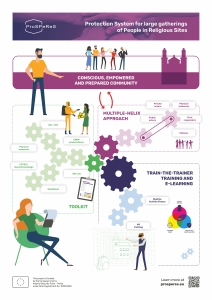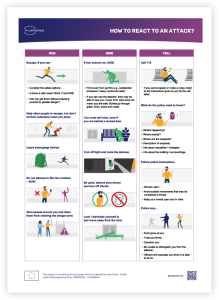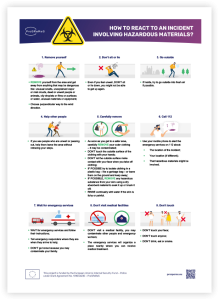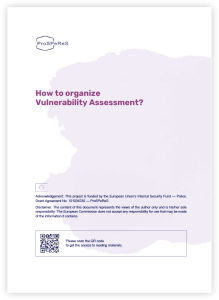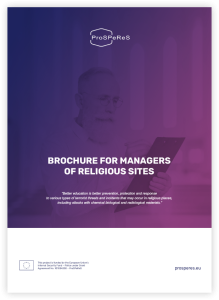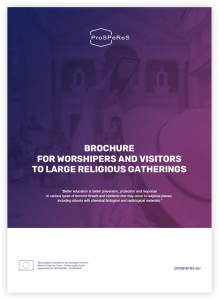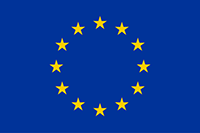Raising awareness activities
In order to reach a common goal of awareness raising campaign respective channels/ ways of communication were chosen: meetings in person, online meetings, webinars, trainings, international conferences, round tables, debates and panels.
While the campaign to congregations, worshipers and society in general is planned to be simple to understand, attractive to watch/listen to and more general in details, the campaign for other two target groups will be more concrete and different from the previous one.
The key element of this activity is to determine the most effective mix of communication ways with target groups, which will be achieved by common dialog of related stakeholders in the first phase of the project.
The proposal for organization of conferences and panels plan is well defined in Security awareness raising campaign strategy and includes organization of:
- International Conference, Challenges and perspectives Jewish, Christian, and Muslim Interfaith Dialogue
- Dialogue panels discussions for high schools, Role of Interfaith dialog in limiting and preventing mass atrocities
- Panels at AWSB, Current security threats in the European Union
- International Conference (final), Protection system for large gatherings of people in religious sites
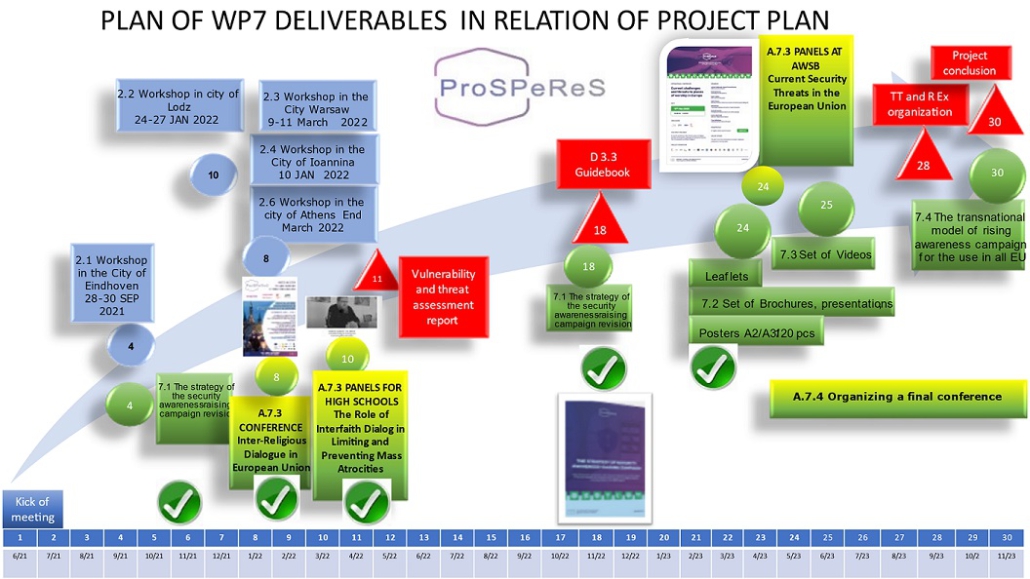
Raising awareness materials
The activities will deliver a toolkit of downloadable materials for awareness-raising purposes, from graphic design and content to distribution. Materials will be in an electronic form and available for printing when needed. Access to materials will be available to the public on project website respecting the project timeline.
All available tools/materials are to be used to achieve successful security raising awareness, because population from all target groups can face terroristic attacks and being affected by them.
Therefore, to increase the education of target groups the follow-on tools/materials are to be developed: brochures and leaflets, posters, newsletters, presentations, articles, videos, eLearning platform.
The role of the awareness toolkit is to inform the public and to raise general awareness of the indicators and signs of terrorism, including local risks (also in cybersphere” or “in digital space”), roles and responsibilities and the models of security-oriented behaviour, i.e.:
- how to report any potentially relevant information or concerns,
- how to promote an understanding in a community,
- how to identify indicators of terrorism,
- how to identify potential signs of individual vulnerability to radicalisation,
- how to recognize signs of extremism, how to understand indications of preparation of an attack using CBRN materials, etc.
- how to behave in the face of the incident.
Printed materials will be placed in sites of worship as well as in locations where these specific communities meet. Ways of distribution will be discussed also with representatives of different religious organizations (including religious newspapers, specialized shops and services).
Last but not least, the project will provide full support to all interested organizations to raise awareness via their own channels (with acceptation of basic principles and rules of the project).
Brochures
Brochures
All of the materials were optimized for self-publishing.
You can download these materials and print it on your own office printer in A4 format.
In case of professional production, please note that there are no bleeds and the imposition process is necessary.
Relevant EU initiatives
Safer and Stronger Communities in Europe (SASCE) https://www.sasce.eu/
The project will impact beneficiaries in 15 EU member states. In the short-term, partners will leverage their network to engage 183 places of worship in security trainings. 1000 places of worship will benefit from technology-enhanced security solutions, constituting a further layer of engagement. Lastly, recognizing the importance of building trust and cooperation between civil society and national authorities, the project will facilitate formalized channels of communication between community leadership and public enforcement authorities.
PROTECTing places of wORship (PROTECTOR) https://www.protector-project.eu/home
Supported by the G20 Interfaith Forum, and being conducted by 5 Law Enforcement Agencies from Belgium, Germany, Ireland, Italy, and Sweden, the PROTECTOR project will design, develop and deliver the next generation of integrated measures to enhance the protection of all places of worship. Combining expertise from leading academic institutions and private sector organisations, the PROTECTOR project will significantly enhance the protection of places of worship through the assessment of hate crime and terrorism threats, examining protective security measures and Law Enforcement Agency responses.
STRENGTHENING THE SECURITY AND RESILIENCE OF AT-RISK RELIGIOUS SITES AND COMMUNITIES (SOAR) https://soarproject.eu/
The network of the partnership is extensive and includes representatives from all majority and minority faiths practicing within the EU. Using innovative communications approaches, increases in the awareness of, and capacity to respond to, physical and human security threats to places of worship will be achieved. This will use the full range of communication channels including the networks of the partnership. The programme will be implemented over two-years in seven pilot EU member states. Beneficiaries include trainings for 1,100 religious leaders and security officers, and onsite trainings with over 1,500 leaders, security officers, women and young people.
solutionS to enHance Interfaith protEction of pLaces of worship from terrorist Danger (SHIELD)
SHIELD’s aim is to protect places of worship from terrorist attacks. To this purpose, the project will gather EU public and private actors – Christian, Jewish and Muslim organisations, security practitioners, LEAs, municipalities, experts in risk detection and technological partners – to identify, for each religion, critical points in places of worship (e.g. holy water fonts, matroneums, muṣalla) as well as circumstances and rituals (e.g. Sunday mass, Shabbat, Jumuʿa) that are more subject to the risk of terrorist attacks. In addition, SHIELD will identify the religious buildings (e.g. schools) that are potentially more vulnerable, as well as the types of terrorist attack (e.g. gunmen raids, bioterrorism, etc .) that would be more likely to be perpetrated.
PROtection and SECUrity for places of Worship (PROSECUW) https://prosecuwproject.eu/
The main objective of the project is to establish cooperation between public authorities and faith-based leaders and congregations aiming at a better understanding of, security threats, promotion of awareness raising activities and the creation of manuals for sharing best practices and relevant tools among EU stakeholders. The activities and deliverables of the project will include, first of all, a documentary that will include digital storytelling from people who have experienced hate crimes and terror in places of worship. This way, hopefully others will feel safer to share their stories and report such crimes. The documentary will be included in other training activities based on training modules that would enhance understating of the safety concerns and cooperation for their resolution. Furthermore, a best practices guide and policy recommendations based on these training activities will be set to be shared EU-wide.


